Each video producer knows the importance of high-quality audio for any production project. Audio editing plays a critical part in ensuring that your film's sound is clear and entertaining. Nonetheless, running into audio problems during post-production is normal, even with the finest recording tools and methods.
The most common problem is background noises, which distract the audience and ruin the experience. Here is where noise reduction in Adobe Premiere Pro comes into play. It provides sophisticated audio editing capabilities that allow editors to remove background noise from audio Premiere Pro.
In this article, you will learn tips and techniques for noise reduction in Premiere Pro. But that is not all—you will also discover an alternative online tool that you can use for noise removal. Whatever your level of editing, keep reading to learn how to make your videos sound great.

In this article
Part 1: Identifying Background Noise in Audio Recordings
If it is inevitable, recognizing and eliminating background noise in audio recordings is vital to stay up with high-quality material. Understanding and recognizing background noise is the initial stage of this procedure. You can call any inadvertent sound you hear after recording or shooting, such as wind, clicking, or buzzing, as background noise.
Listen to your audio file and pay attention to any noises that do not belong to help you identify background noise. Check for any hissing, static, or other unwelcome noises that can interrupt the audio's quality.
- Wind can make noise by striking the camera or by picking up the sound of the wind blowing across a microphone's surface.
- Every mode of transportation, including passing vehicles, trains, and planes, can contribute to traffic noise.
- Electrical equipment or machinery produces humming noise, which can be a distracting and ongoing issue.

It is crucial to take action to reduce or remove background noise once you have detected its origins in your audio. Consider using a windshield to filter out extraneous sounds to reduce wind noise. Try to video in a calmer setting to reduce road noise or use a directional microphone to concentrate on the individual's voice. Highlight using a noise gate or high-pass filter to prevent humming or buzzing sounds.
Once you have completed filming, the next step in post-production editing is to remove background noise using Premiere Pro. Using software to reduce noise can make a significant difference in the quality of your final product.
Part 2: Guide on How to Remove Background Noise From Audio in Adobe Premiere Pro
It is time to act and clean up your audio tracks now that you are aware of the many background noise sources. Because as you know, these might reduce the quality of your audio and video recordings. Adobe Premiere Pro has a comprehensive audio effects panel that you can use to reduce background noise. You can also use it to enhance the audio quality of your recordings.
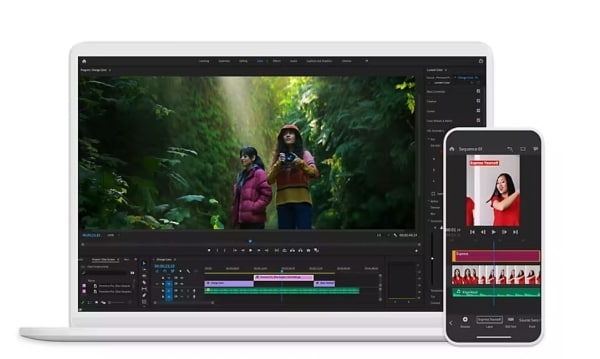
You may get a professional-sounding result by using the audio editing features for noise reduction in Adobe Premiere Pro. You can edit audio with Adobe Premiere Pro, apply effects, and mix as many audio files into a sequence as your device system can manage. Channels in tracks can be mono or 5.1 surround. There are also regular tracks and adaptive tracks.
The following methods will walk you through noise removal using Adobe Premiere Pro. It should enable you to achieve professional-grade audio.
Step 1
Install and run Adobe Premiere Pro on your desktop, then import your audio clip.
Step 2
Select the desired clip(s) in the Adobe Premiere Pro dashboard. Then click Effects in the upper navigation pane.
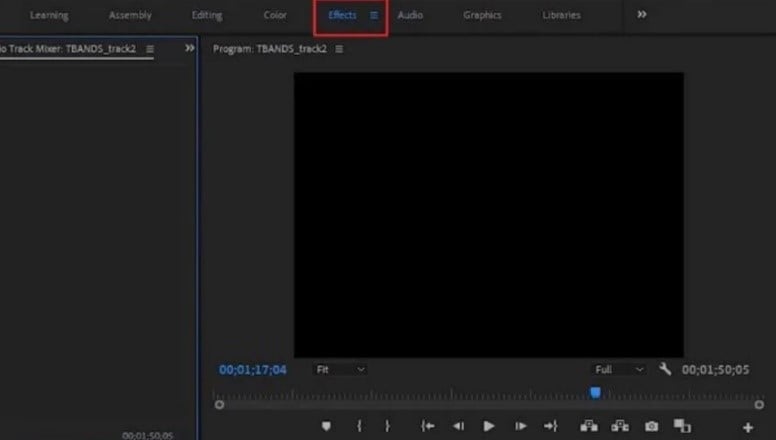
Step 3
In the Effects section on the left side navigation pane, double-click Audio Effects > Noise Reduction/Restoration > DeNoise.
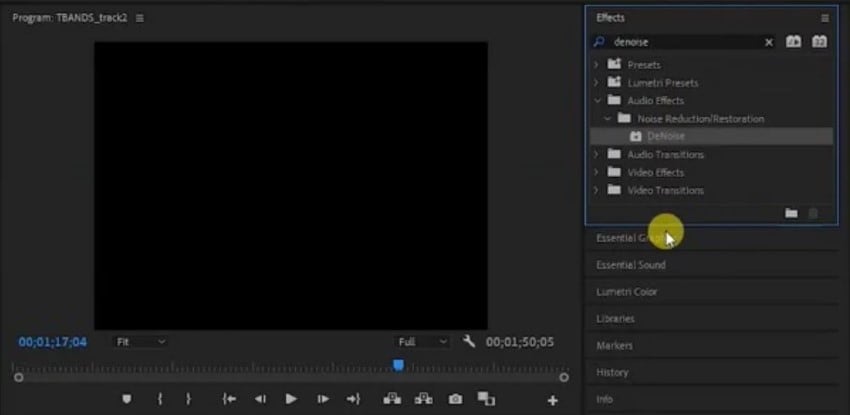
Step 4
To access the Effect Controls, click Edit. Adjust the Reduction knob until it reaches -10db; remember that all clips begin at a value of zero.
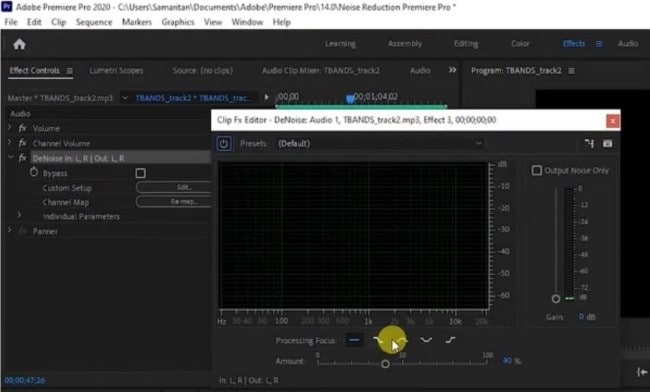
Step 5
Click the Play button to hear how the audio effect sounds in real-time.
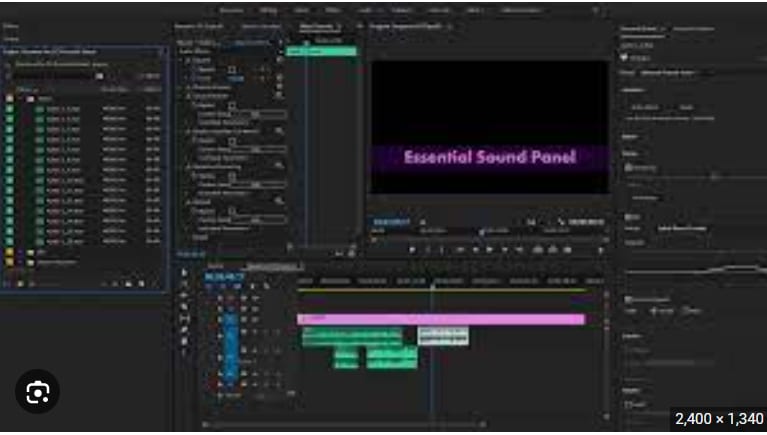
Tip:
Use the Gain slider to restore the audio level since decreasing noise or reverb lowers clip volume.
Part 3: How to Remove Background Noise From Audio Using Online Tools
Audio editing is an essential aspect of video production with a significant role in delivering a high-quality finished product. While advanced software like Adobe Premiere Pro provides a comprehensive suite of audio editing tools, not everyone can access it. It is where online tools like Wondershare Media.io Vocal Remover come in handy. It provides a convenient and accessible solution for reducing noise in audio recordings.
This online tool boasts several features, including:
- Ease of navigation. No matter what amount of skill a person has, they may use Media.io Vocal Remover since it has a straightforward and intuitive interface. Since it has a user-friendly design, you quickly remove background noise from your audio recordings.
- Accessible. Also, you may tweak your audio recordings from anywhere since you can access them from any device with an internet connection. It is affordable and does not need installation, giving users a hassle-free experience.
- Supports import of all major file types. It supports almost all popular audio and video formats, such as MP3, MP4, and WMV. It makes this online tool flexible and practical for audio editing.
By automating the entire process of removing voices from music recordings, users can save time and effort compared to editing and combining audio manually. Wondershare Media.io Vocal Remover can help make audio recordings seem crisper and more professional by reducing excessive vocals and background noise.
Ready to see Wondershare Media.io Vocal Remover in action? Give it a spin by removing background noise from your audio tracks. Here is a quick tutorial on how to use the tool for your production projects.
Step 1
Visit the official website of Media.io Vocal Remover on your browser. Then click Upload to import audio music or video recordings from your device.
Step 2
There is no need to manually separate the vocals and music from your audio files when using Wondershare Media.io Vocal Remover. The platform automatically does it for you, so wait after a brief analysis. The time it takes to complete this process will depend on the file size.
Step 3
Before you download your split tracks, take a moment to preview them and make sure they sound the way you want. Click the Play button next to each track to listen to them. Next, click Download when you are happy with it, and you are good to go.
Note:
Whenever you use Wondershare Media.io Voice Remover, you can expect all tracks to be output in the MP3 format by default.
Part 4: Best Practices for Noise Removal During Audio Editing
There are two primary purposes for audio monitoring. One is to provide the recording engineer and producer the opportunity to check the musical and technical parts of the process. The other is to see how the listener will receive the recording.
Now you uncover how to use Wondershare Media.io Voice Remover as an alternative to Adobe Premiere Pro. In this section, you will find some of the most effective ways to reduce noise when editing audio and video files. While these programs may be helpful, several more methods and hints might improve your audio quality even further.
Whether you are editing a podcast, music track, or video clip, these practices will help you generate a clean and professional sound.
Determine the Type of Noise
You should identify the source of background noise in your recording. That way, you will know which tool to remove effectively. The different audio effects in Premiere Pro let you remove background noise efficiently. For instance, the Reduce Noise effect removes unwanted background sounds like clicking. You can also use the DeHum audio effect when you hear electrical interference in your audio clip.
Use Automation
Automation can easily replace tedious, repetitive jobs that waste time. Once you have laid out your process, examine each step and consider if the time you spent is worthwhile. It frequently facilitates the discovery of operations that you can automate instead. There is a probability that an application exists that you can include in your workflow if you believe it is ideal for automation.
Use Noise Reduction Tools Sparingly
While they might be helpful, it is vital to avoid using them excessively. Getting rid of too much noise can produce a robotic or artificial sound. Aim to strike a balance between eliminating background noise and preserving a genuine sound by using noise reduction technologies sparingly.
Wear Headphones
It is a good idea to wear headphones when editing audio. It will help you to hear any lingering noise more clearly and make more exact changes.
Maintain a Copy of the Original Audio File
Before performing any post-production editing, remember to keep a copy of the original audio file. If you make a mistake or the noise reduction procedure goes too far, you may start over thanks to this.

